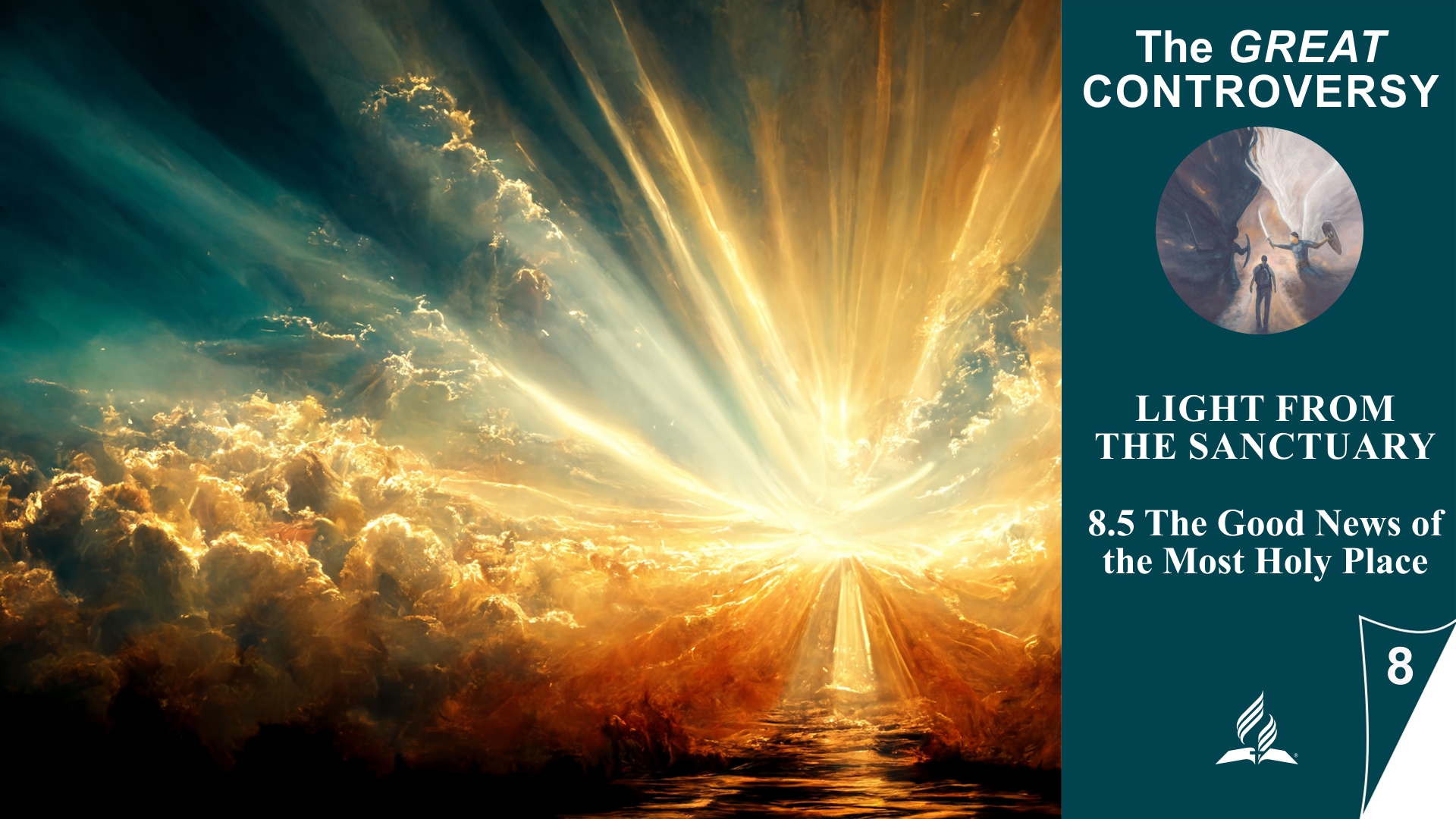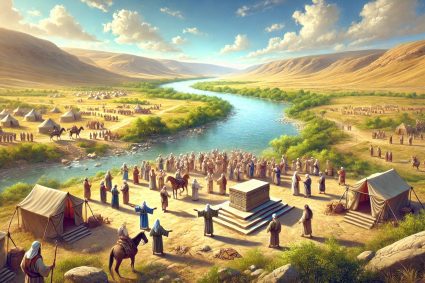


8.5 Jesus, Our Advocate in the Judgment
The Immeasurable Grace: Jesus’ Intercession and Perfection
Read Hebrews 10:9–14. What difference between the service of the priest in the earthly sanctuary and the service of Jesus in the heavenly sanctuary does this passage reveal?
Differences between the earthly and heavenly priesthood:
-
Singular Sacrifice vs. Repeated Sacrifices:
-
Earthly Priest: The priests in the earthly sanctuary must perform their service daily and offer the same sacrifices repeatedly, which, however, can never completely take away sins (Verse 11).
-
Jesus: Christ offered a single, perfect sacrifice that once and for all took away sins (Verse 12).
-
-
Atonement:
-
Earthly Priest: The repeated sacrifices of the earthly priestly service are incapable of truly atoning for sins (Verse 11).
-
Jesus: Through His sacrifice, Jesus has definitively removed sins and sanctified believers forever (Verse 14).
-
-
Position and Perfection:
-
Earthly Priest: The priests serve daily and perform their duties without a final conclusion.
-
Jesus: After His sacrifice, Jesus sat down at the right hand of God, a sign of completion and authority. He waits for His enemies to be made a footstool for His feet (Verses 12–13).
-
-
Sanctification:
-
Earthly Priest: The repeated sacrifices of the earthly priestly service could not ultimately sanctify people.
-
Jesus: Through His singular sacrifice, Jesus has perfected forever those who are being sanctified (Verse 14).
-
In summary:
The service of the earthly priests was characterized by repeated sacrifices that could not completely remove sins. In contrast, Jesus’ service in the heavenly sanctuary, through His singular sacrifice, has completely removed sin and sanctified believers forever. Jesus now sits at the right hand of God and acts as our advocate in judgment. This completion and ultimate sanctification through His sacrifice fundamentally distinguish Jesus’ heavenly priesthood from that of the earthly priests.
Read Hebrews 6:19–20. Why does Jesus invite us to follow Him? What do we discover when we follow Him?
Why does Jesus invite us to follow Him?
Jesus invites us to follow Him because He is the way, the truth, and the life (John 14:6). Through His death on the cross and His resurrection, He opened the way to reconciliation with God and gave us the opportunity to enter into His presence. He invites us to follow Him so that through Him, we may obtain redemption and eternal life.
What do we discover when we follow Him?
When we follow Jesus, we discover the hope that serves as a sure and steadfast anchor for our lives (Hebrews 6:19). Through faith in Jesus, we have access to a holy place behind the curtain, which represents the way to the throne of God. There, we can discover the light from the cross at Golgotha and gain a clearer insight into the mysteries of redemption. Jesus, our forerunner, has entered the heavenly sanctuary as the High Priest forever, to intercede for us and present our sincere desires before God.
When we follow Jesus, we also discover the significance of His mediation in the heavenly sanctuary. Through His intercession, we can receive the blessings of the atoning sacrifice and experience the perfect redemption He obtained through His sacrifice on the cross. His service in the heavenly sanctuary enables us to commune with God and be part of His eternal plan of salvation.
How does Christ’s death on the cross relate to His intercession in the heavenly sanctuary, and why is judgment so necessary for the plan of redemption?
Christ’s death on the cross and His intercession in the heavenly sanctuary are closely connected and play a central role in the plan of redemption.
-
Connection between the Crucifixion and Heavenly Intercession:
-
Crucifixion: Through His death on the cross, Jesus Christ defeated sin and death. His sacrifice was perfect and singular, enabling humanity’s redemption from the power of sin and the consequences of disobedience to God.
-
Heavenly Intercession: After His death, Jesus entered the heavenly sanctuary as the High Priest to intercede for us. His intercession means that He stands before God to represent our sins and grant us access to God’s grace and forgiveness. By constantly interceding for us, He mediates the blessings of His sacrifice on the cross and grants us the opportunity to be reconciled with God.
-
-
Necessity of Judgment in the Plan of Redemption:
-
Judgment is necessary to fulfill God’s justice and demonstrate His rule over sin and evil. It serves to give an account and reward those who have remained steadfast in faith in Christ, while also punishing those who have turned away from God.
-
Judgment reveals the final alignment of people’s hearts and determines their eternal destiny. It separates those who have faithfully served God from those who have chosen a life of rebellion against God.
-
Through judgment, the righteousness of God is revealed by justifying and redeeming those who believe in Christ and accept His offer of grace, while condemning those who turn away from Christ and reject His offer of grace.
-
Ultimately, judgment contributes to the full manifestation of God’s holy character and His immutable morality. It demonstrates His love for justice and His mercy toward those who turn to Him in repentance and faith.
-
Overall, Christ’s death on the cross and His intercession in the heavenly sanctuary are closely connected, and judgment is an essential part of the plan of redemption, revealing God’s justice, love, and mercy.
The connection between Christ’s death on the cross, His intercession in the heavenly sanctuary, and our daily lives and faith is fundamental:
-
Redemption and Forgiveness: The fact that Jesus died on the cross to forgive our sins and now intercedes for us in the heavenly sanctuary has direct implications for our daily lives. We can live knowing that our sins are forgiven through Christ and that He represents us before God when we trust and believe in Him.
-
Hope and Security: When we follow and trust Jesus, we discover the hope and security that only He can offer. His intercession in the heavenly sanctuary gives us the assurance that we are justified before God and that our future is secure in His hands. This hope shapes our daily lives, providing us comfort and confidence amidst all challenges and difficulties.
-
Relationship with God: Through Jesus, we have access to an intimate relationship with God. His death on the cross and His intercession in the heavenly sanctuary enable us to live in communion with God and experience His love and mercy daily. This relationship shapes our daily lives, giving us direction and purpose.
-
Responsibility and Faithfulness: Knowing that Jesus died for us and intercedes for us before God, we are called to follow Him and remain faithful. Our daily lives should be characterized by gratitude and devotion as we strive to do God’s will and live a life that reflects His example.
Overall, the connection between Christ’s death on the cross, His intercession in the heavenly sanctuary, and our daily lives shows that our faith is not just an abstract belief but has a direct impact on our daily actions and our relationship with God. By following Jesus and trusting in His intercession, we can lead a life characterized by hope, security, and unconditional love.

The immeasurable grace: Jesus’ intercession and perfection demonstrate the difference between the earthly and heavenly priesthood.
(Visited 23 times, 1 visits today)
























